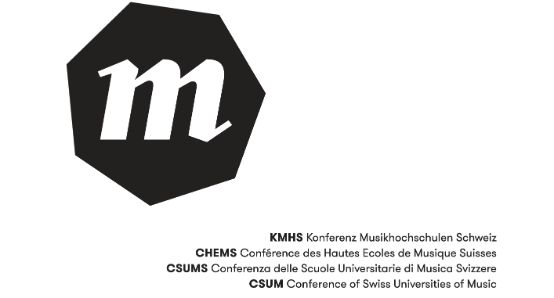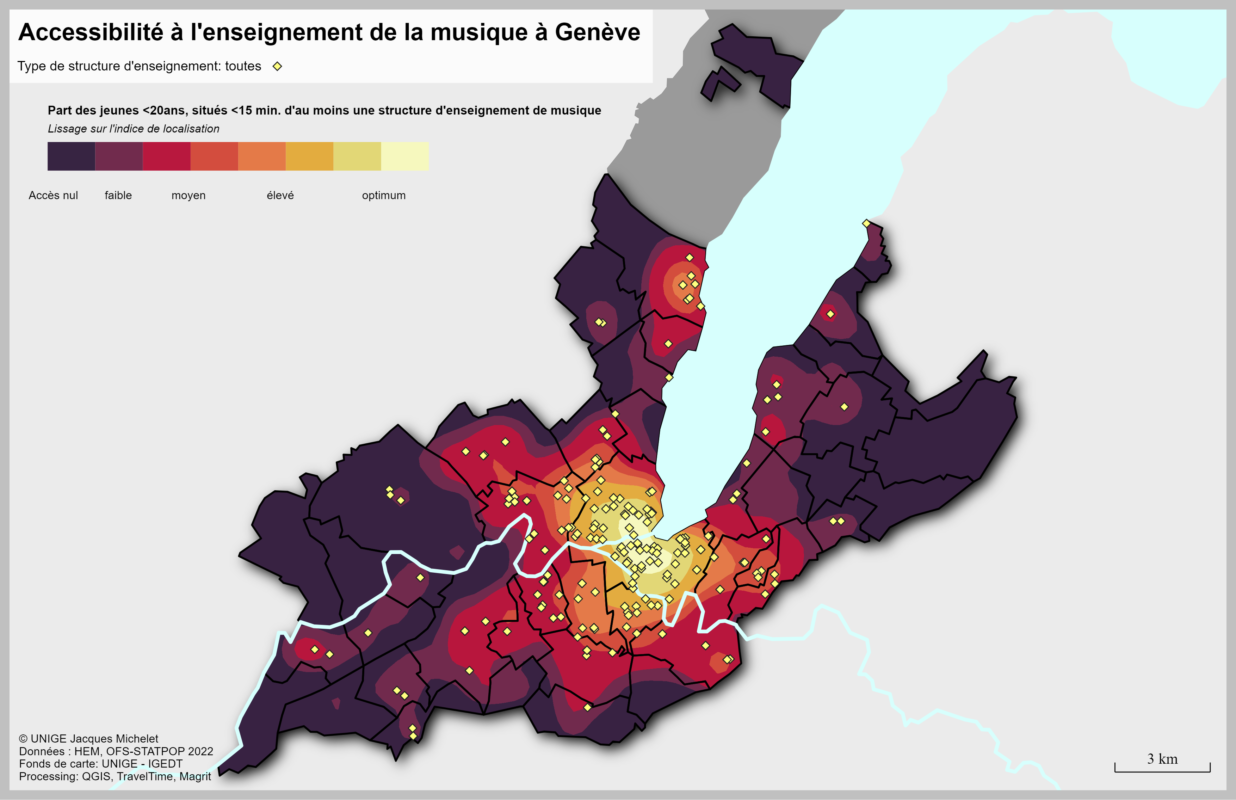Change of presidency at the head of CHEMS

Interview with CHEMS' new president, Noémie L. Robidas, and its new vice-president Valentin Gloor.
Matthias von Orelli - Noémie L. Robidas, Director of the HEMU - Haute École de Musique et Conservatoire de Lausanne, is the new President of CHEMS. Together with new Vice-President Valentin Gloor, Director of the Music Department at the Lucerne University of Applied Sciences, she will give an overview of ideas for CHEMS.
Noémie L. Robidas (NR), on October 31, 2020, you took over the presidency of CHEMS. What does this task mean to you?
A key word for me in this new task is "federate": federate colleagues around the CHEMS project and federate CHEMS with the Swiss music community. Together with Vice-President Valentin Gloor, I'll also be raising new issues that represent today's challenges for our schools. Some people like to imagine that the Swiss music colleges are in competition with each other (which I haven't personally felt to date), but for me, given today's societal challenges, it's very important to move beyond this position and show solidarity in order to meet the challenges that lie ahead. It's important to present the Swiss music colleges as mutually complementary, and to assert loud and clear the specificity of our schools' missions, which are sometimes diluted in the magma of Switzerland's universities of applied sciences.
Valentin Gloor (VG), Sie werden als Vizepräsident amten, worin sehen Sie die Herausforderung der nächsten Jahre?
Die Gesetzgebungsprozesse der letzten Jahre haben dazu geführt, dass die Fachkonferenzen - also auch die KMHS - ihre Rolle neu definieren müssen. Im von Noémie schön als " Magma " der Fachhochschulen beschriebenen Umfeld ist nicht mehr wirklich geregelt, welche Stimme eine Konferenz wie die KMHS hat, wann sie gehört wird und wozu sie sich äussern kann. Dass die KMHS als Stimme dieses wichtigen Bereichs gehört werden muss, ist aus unserer Sicht klar. Nur so können die Anliegen der tertiären Musikbildung eingebracht und fruchtbar gemacht werden. Und nur so können, im grossen Kontext, die Künste das notwendige Gewicht in der Fachhochschullandschaft aufbringen und zur Weiterentwicklung der Fachhochschulbildung und der ent-sprechenden Berufsfelder beitragen.
Ms. Robidas, do you have a shared vision for your mandate as President and Vice-President?
I can't say too much about our "vision" at this stage, as it will be some time before it becomes concrete. In any case, it will be a vision co-developed with Valentin Gloor and shared with CHEMS colleagues. Indeed, collegiality must prevail in our organization, and subjects must be well distributed according to the forces present. While some of the issues surrounding the Bologna reform were the subject of major battles from 2005 to 2015, other challenges now lie ahead. Like our schools, CHEMS needs to reorient itself and be seen as creative, a force to be reckoned with and a force to be reckoned with, particularly in the eyes of the funding authorities.
VG: In der Tat müssen wir dieser Vision noch mehr Raum für die interne Diskussion geben, damit sie eine geteilte Vision der gesamten KMHS ist. Die Zusammenarbeit unter den Mitgliedern der KMHS ebenso wie die Zusammenarbeit der KMHS und ihrer Mitglieder mit weiteren Akteuren im hochschul- und kulturpolitischen Umfeld werden wesentliche Erfolgsfaktoren für unsere Arbeit der nächsten Jahre sein. Die Erarbeitung einer gemeinsamen Vision der KMHS ist dazu ein zentraler Schritt.
You studied in Canada and France, and worked in France for a long time. How do these countries differ from Switzerland in terms of musician training?
NR : It's hard to compare these three countries in this way, especially as there's still an ocean between Canada and Europe... In Canada, the Hautes Écoles de Musique are generally integrated into a university - all music studies are housed within the same faculty.
Higher music education in France stands out from other European countries. In addition to the two CNSMDs in Paris and Lyon, which offer excellent conditions for advanced degrees, there are a dozen "Pôles Supérieurs", all affiliated with universities so that their degrees (Bachelor's, Master's) can be recognized. Study conditions are highly variable, and one thing is certain: the infrastructure and budgets allocated are far from sufficient. This can be explained by the fact that, historically, it was the Conservatories that provided the initial teaching resources, which were not redirected when the Pôles supérieurs were created. So, in France, initial teaching offers better framework conditions for both teachers and students than those offered in higher education. On the other hand (because not everything is negative, far from it!), the promotion of music in France is part of the country's cultural policy, which aims to support and promote artistic creation at all levels, and to make the works of this creative activity, especially those of particular artistic importance (notably contemporary creation), accessible to as many people as possible. As far as Switzerland is concerned, inter-cantonal diversity is undoubtedly the most important factor to be taken into account! The presence of eight HEM in Switzerland is a strong sign of the authorities' encouragement of culture and music in particular. I'm delighted to see this, and in my new role as President of CHEMS, I'll be doing my utmost to highlight the importance of these schools for our country. We attract thousands of talented young people from all over the world, which is a source of great pride for Switzerland. We now need to focus on promoting and supporting young Swiss talent as effectively as possible, developing artistic research and nurturing links with the professional world - all of which are essential items on our national agenda.
It's inevitable to talk about the COVID crisis, which continues to have a major impact on our daily lives. In your opinion, how were Swiss music colleges prepared for such a situation, and how did they react?
NR : I'll sum it up in a few words: basically, the music colleges weren't really well prepared, with a few exceptions perhaps. On the other hand, I was surprised and touched by the speed with which all these measures could be implemented and the schools adapted to the new circumstances. It is now important to learn the lessons of this period and try to better coordinate and harmonize our actions, at all levels. CHEMS could certainly provide a forum for joint reflection in this respect.
VG: Dieser Reflexionsraum ist von grosser Bedeutung, um die gewonnenen Erkenntnisse für die weitere Entwicklung unserer Musikhochschulen fruchtbar zu machen. Dabei gibt es wohl mindestens drei unterschiedliche Arbeitsfelder: Die weitere Erfüllung unseres Auftrags in und trotz der schwierigen Ausgangslage hat inhaltlich neue Formen des Unterrichtens, der Zusammenarbeit, der Aufführung und Produktion und Beforschung von Musik hervorgebracht. Diese neuen Formen geben uns eine spannende Basis für nächste Schritte und Zukunftsprojekte. Die Krisenbewältigung hat aber auch strukturell unsere Musikhochschu-len - ebenso wie sämtliche Institu-tionen unserer Gesellschaft - auf eine Bewährungsprobe gestellt. Hier wurde unter dem Brennglas sichtbar, wie unsere Organisationen funktionieren, wo sich Abläufe, Zuständigkeiten und Aufgaben klären und besser verteilen lassen. Auch dieses Feld sollten wir gemeinsam reflektieren. Und last but not least hat sich gezeigt, wie belastbar unsere Ver-bindungen zum Umfeld sind - seien dies unsweere jeweiligen Gesamt-Fachhochschulen oder unser Austausch mit den politischen und behördlichen Entscheidungsträger*innen. Auch dies ist zu analysieren - eine gezielte Stärkung in diesem Bereich kann die Arbeit der Musikhochschulen ganz entscheidend unterstützen.
For the cultural sector in particular, these events were and still are catastrophic - what lessons are you currently drawing from them?
NR : Unfortunately, this crisis isn't over yet. I have to say that I'm more worried at the moment than I was during the lockdown. There's a lot of uncertainty, because we want to organize concerts and events again, and at the same time the protection of all concerned must be guaranteed. We also need to understand what this normalcy we'd like to return to looks like. In my opinion, there's no point in being nostalgic - we have to accept the situation and adapt to it, as far as possible, by being proactive and inventing new formats.
VG: Da stimme ich meiner Kollegin natürlich vollständig zu! Und gerade dies scheint mir eine wesentliche Rolle der Musikhochschule: Nicht nur als Vermittlerin des Bekannten und des Bewährten zu wirken, sondern eben auch als Labor für dasjenige, das sich noch entwickelt - offen für unerwartete Ergebnisse.
Eine wichtige Aufgabe der KMHS scheint mir aber auch darin zu bestehen, sämtliche Bemühungen unserer kulturellen sowie bildungs- und kulturpolitischen Partner zur Aufrechterhaltung und Stärkung des Kultursektors gerade in dieser prekären Situation deutlich und klar zu unterstützen.
You've said that you want CHEMS to be heard more at the political level too. Where do you want to start?
NR : For me, the political system in Switzerland is still a bit mysterious at times, but I think it's important for political work to be present and visible. At the end of the day, it's all about lobbying. As mentioned above, I think we need to be educational. So that politicians understand that music colleges are different from other universities of applied sciences. That's why I think it's so important to work together. We need to explain that music cannot be measured purely economically by ticket sales or the umpteenth performance of Vivaldi's Four Seasons, or quantitatively by the number of publications by our teacher-researchers. Colleges of music are also laboratories and experimental facilities that must be supported and protected because they bring something else to the table: a musical, artistic and sensitive vision.
CHEMS also symbolizes cooperation between music colleges. How does this currently work, or what potential do you see for your work as President? Does this also apply to coordination with foreign partner universities?
NR : Historically, there have always been close links with music colleges in Germany. In addition, all regions of Switzerland naturally have their own partnerships with neighboring countries, which I find fascinating. These links need not only to be strengthened, but also nurtured and, if necessary, agreed upon. Europe is such a big place, it seems to me that we should above all be looking for quality partnerships with privileged links, rather than trying to multiply them without any concrete aim; this will certainly be a subject to which Valentin Gloor and I will devote ourselves with CHEMS.








